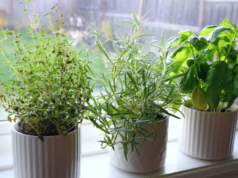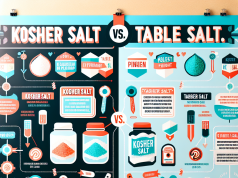Contents
How can herbs be used to reduce food waste in the kitchen?
Herbs are not only a great way to add depth of flavor to dishes, but they can also be used to reduce food waste in the kitchen. Here are a few examples:
- Herbs can be used to revive wilted vegetables. Simply place the vegetables in a bowl of cold water with a handful of chopped herbs, such as parsley or cilantro, for an hour or two to refresh them.
- Herbs can be used in stocks and broths to enhance flavor without relying on meat ingredients.
- Herbs can be used to make vinegars and oils infused with flavor. This is a great way to use up leftover herbs before they go bad.
- Herbs can be used to make pestos, sauces, and marinades that can be used to dress up leftovers or older ingredients.
By incorporating herbs into your cooking routine, not only will you add delicious depth of flavor, but you’ll also be reducing food waste and getting the most out of your ingredients.
Introduction
Food waste is a major problem in the world today. According to the United Nations, about one-third of all food produced in the world for human consumption is wasted. This is not only a loss of resources and money, but it also contributes to environmental problems such as greenhouse gas emissions. Fortunately, there are many ways we can reduce food waste in the kitchen – and one of these ways is by using herbs. In this blog post, we will explore how herbs can be used to reduce food waste in the kitchen.
Herbs to the Rescue
There are a variety of herbs that can be used to reduce food waste in the kitchen. Here are some examples:
Basil
Basil is a popular herb that is often used in Italian cuisine. It can be used in a variety of dishes, including soups, salads, and pasta sauces. One way to reduce food waste using basil is to use it to make pesto. Pesto is a sauce made from basil, garlic, pine nuts, and olive oil. It can be used as a spread for sandwiches, a sauce for pasta, or a dip for vegetables. Using basil to make pesto is a great way to use up any leftover basil before it goes bad.
Mint
Mint is a refreshing herb that is often used in beverages, such as tea and lemonade. It can also be used in salads, sauces, and desserts. One way to reduce food waste using mint is to add it to water. This can make plain water more interesting and can help you drink more water – which is important for staying hydrated.
Cilantro
Cilantro is a herb that is often used in Mexican and Asian cuisine. It can be used in salsas, guacamole, and curries. One way to reduce food waste using cilantro is to make chimichurri sauce. Chimichurri sauce is a sauce made from cilantro, garlic, vinegar, and oil. It can be used as a marinade for meats or a sauce for vegetables. Using cilantro to make chimichurri sauce is a great way to use up any leftover cilantro before it spoils.
Conclusion
Reducing food waste is an important goal, and using herbs is just one of many ways we can achieve this. By using herbs like basil, mint, and cilantro in creative ways, we can make our meals more interesting and flavorful while also reducing food waste in the kitchen. There are many other herbs that can be used in similar ways, so don’t be afraid to experiment and try new things. Together, we can make a difference and help reduce food waste in the world.
Sources
United Nations. (2019). Food Waste. Retrieved from https://www.un.org/sustainabledevelopment/wp-content/uploads/2019/07/15_Why-it-Matters_Goal-12_Food-Waste.pdf
FAQs – How can herbs be used to reduce food waste in the kitchen?
Q: What are some common herbs that can be used to reduce food waste?
A: Some common herbs that can be used include parsley, basil, cilantro, and mint.
Q: How can herbs be used to reduce food waste?
A: Herbs can be used to add flavor to dishes, which can help to enhance the taste of food that may be nearing its expiration date. Additionally, they can be used to preserve and extend the life of fresh produce by making herbal infusions or simple syrups.
Q: How can I make an herbal infusion or simple syrup?
A: To make an herbal infusion, steep fresh or dried herbs in hot water and strain the liquid. This can be used to add flavor to soups or sauces, as well as to create refreshing drinks. To make a simple syrup, combine equal parts of sugar and water in a saucepan and heat gently until the sugar has dissolved. Add fresh herbs and simmer for a few minutes, then strain the syrup and discard the herbs. This can be used to sweeten drinks, desserts, or glazes for meats or vegetables.
Q: How can I store fresh herbs to reduce waste?
A: Fresh herbs can be stored in the refrigerator in a plastic bag or container with a damp paper towel. This will help to keep them fresh for longer and prevent them from wilting or spoiling quickly.
Q: Are there any safety concerns when using herbs to reduce food waste?
A: It is important to ensure that herbs are clean and free from any contaminants before use. Wash them thoroughly with cold water and dry them carefully before using. Also, be aware of any potential allergies to certain herbs and use them in moderation.
The Benefits of Growing Herbs in Your Kitchen
Why Growing Herbs in Your Kitchen is a Great Idea
If you love cooking, you know how important herbs are to add flavor to any dish. Instead of buying them at the grocery store, you can grow your own herbs in your kitchen. Here are some benefits of having a small herb garden in your kitchen:
- Having fresh herbs on hand all the time
- Saving money on buying herbs at the grocery store
- Adding flavor to your dishes without adding calories or unhealthy ingredients
- Decorating your kitchen with beautiful plants
- Feeling a sense of accomplishment when you harvest your own herbs
The Best Herbs to Grow in Your Kitchen
Some of the best herbs to grow in your kitchen include:
- Basil
- Chives
- Mint
- Oregano
- Parsley
- Thyme
These herbs are easy to grow and care for in a small pot in your kitchen. Plus, they are versatile and can be added to many different dishes.
Start Your Own Herb Garden Today
If you’re ready to start your own herb garden in your kitchen, be sure to choose a sunny spot and use well-draining soil. Water your herbs regularly and prune them frequently to encourage growth. With a little care and attention, you’ll have a beautiful herb garden in no time.
For more information on herbs and their uses, visit Wikipedia’s Herb page.
Using Herbs to Reduce Food Waste in the Kitchen
- Adding herbs to dishes can enhance flavors and save ingredients that may be past their prime.
- Herbs like basil, parsley, and mint can be used to make pestos or sauces with wilted greens or herbs.
- Drying and storing excess herbs can prevent waste and provide seasoning for future dishes.
- Herbs can also be infused into oil or vinegar to preserve and add flavor to leftover vegetables.
- Using herbs in homemade stocks or soups with leftover vegetables and meat scraps can maximize flavor and minimize waste.
Category – Pepper, Salt and Herbs








































